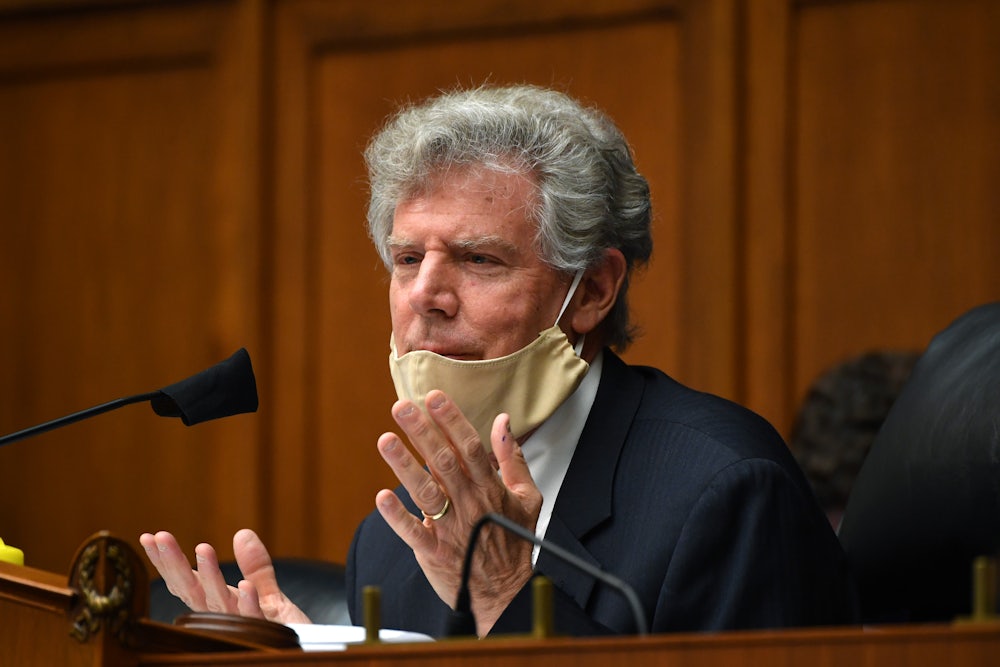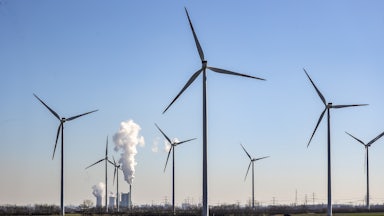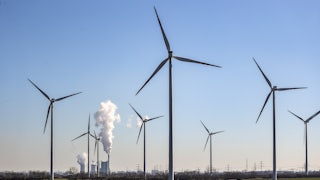Last fall, the House Oversight Committee convened to grill oil and gas CEOs about their funding of climate disinformation. Democrats asked the CEOs whether they would commit to lowering fossil fuel production for the sake of the planet. This week, less than 48 hours after the release of an Intergovernmental Panel on Climate Change report showing that existing fossil fuel infrastructure would push the world past 1.5 degrees Celsius (2.7 degrees Fahrenheit) of warming, many of those same executives were chided by Democrats for not drilling more. The House Energy and Commerce Committee’s hearing on Wednesday about price gouging offered a window into how Democrats are fumbling through two crises at once.
People aiming to keep gas prices low and confront the climate crisis now share a common enemy—the fossil fuel industry—but a different goal. Previously, climate activists and progressives were the ones known for going after Big Oil CEOs. But with gas prices surging, that sport has gone mainstream. Unfortunately, it’s also gotten a lot more confusing.
That fossil fuel companies are making bank amid human suffering is true, of course. The top five U.S.-based oil producers got nearly $2 billion back from the IRS between 2015 and 2022, and paid out an annual average of $40.3 billion in dividends and stock buybacks through that time. There’s an obvious injustice to multinational corporations paying very few taxes and reporting record profits as gas prices soar, which is why a number of lawmakers have recently proposed a windfall tax on such profits. That revenue would help ease pain at the pump.
A considerable number of Democrats—including most of those who spoke in Wednesday’s hearing—would also like oil companies to drill much more, in order to lower gas prices ahead of the midterms and send more U.S. fuel to Europe. The industry has said it’d like to drill more, too. These two camps, however, have different understandings of what the barriers to greater fuel production are. Democratic critics say oil and gas companies are translating high gas prices into stock buybacks and executive level pay, rather than lowering gas prices by increasing production. Fossil fuel companies, in turn, say they can’t drill more because of constraints from investors, compounded by hostile signals from an environmentalist administration. Republicans—many of them receiving generous donations from those companies—are extra focused on the final point. Obviously, the more they can blame high gas prices on the White House, the better.
All of the above parties want to see more fossil fuel production. None of them are engaging with the findings of the IPCC’s recent report: that to meet the goals of the Paris Agreement, global coal, oil, and gas use will need to decline by 95, 60, and 45 percent respectively by 2050 (compared to 2019 levels).
Energy and Commerce Committee Chair Frank Pallone’s message to fossil fuel CEOs on Wednesday was clear: “Your companies need to do their part to increase production to meet demand.” Washington Democrat Kim Schrier raised the same concern in the form of a question. “What is the most important thing,” she asked, that “it will take to ramp up oil and gas production to pre-pandemic levels?” New York Representative Yvette Clarke was the odd woman out among her colleagues. “Oil is an unstable global commodity that is completely out of our control,” she said. “Now is not the time to drill more,” Clarke added, before calling for increased investments in clean energy.
/ In honor of Earth Day, Apocalypse Soon content is free to registered users until April 29. Start reading now.
Mentions of climate change (vague as they were) came mainly from the executives gathered, whose opening remarks were filled with well-honed talking points about their commitment to a “transition,” “the future,” and, as BP America CEO David Lawler put it, “resilient hydrocarbons.” The first mention of the IPCC’s report came two and a half hours in, courtesy of California Congressman Scott Peters. He suggested companies might produce “clean gas” by eliminating methane emissions from their production processes. The report and the climate crisis were brought up sporadically by Democrats thereafter, in part as a means of asking executives to expound on their so-far meager spending on low-carbon energy.
The hearing came as several members of the Congressional Progressive Caucus have started coming around to Senator Joe Manchin’s demands in order to pass whatever clean energy provisions can be salvaged from the now defunct Build Back Better Act. Though he’s provided few specifics, Manchin seems to be demanding various giveaways to fossil fuel companies, pulled from a long-standing industry wish list that includes fast-tracking new fossil fuel infrastructure. “If [Manchin] wants some increase for short-term production for the broader package of $500 billion on renewables, I am open to that,” California Congressman Ro Khanna—who led last fall’s House Oversight Committee hearing—told Politico. “It’s not ideal for the climate, but I am not comfortable with Americans paying six, seven bucks for gas.”
Despite what Manchin and Republicans have argued, there are very few external constraints on drilling being imposed by the Biden administration. As Representative Paul Tonko pointed out, oil production has increased by more than two million barrels per day since Biden took office. In its short tenure the Biden administration has approved more oil and gas drilling on public lands per month, on average, than Donald Trump’s did in its first three years in office. Before Russia invaded Ukraine, the U.S. was already the world’s largest oil producer and on track to be the world’s largest exporter of gas thanks to changes made during the Obama administration. While pledging to work with the EU to reduce energy demand abroad, the Biden administration has been relatively quiet about doing the same at home; instead of emphasizing investments in energy efficiency, public transit, etc., to free up oil and gas in the U.S. to send abroad to address the Ukraine crisis, the administration seems to be assuming that domestic demand for oil and gas will keep steady and should be met with expanded supply. Jose Fernandez, the State Department’s undersecretary for economic growth, energy, and the environment, told gas executives this week that the administration “believes that we can address the energy security crisis and at the same time keep our focus on the overall goal of decarbonizing.”
But beggars can’t be choosers. Republicans and executives made clear what their wishlist is for ramping up production in the way Democrats want. That means “long-term” certainty, as Republican Morgan Griffith put it, that fossil fuels will be indefinitely profitable. Griffith specifically said that a “temporary green light to produce oil from the Biden administration” wouldn’t be sufficient. Accordingly, Pioneer Resources head Scott Sheffield told lawmakers during the hearing on Wednesday that he wants more pipelines and liquified natural gas export terminals, infrastructure likely to stay online past 2050.
That Democratic lawmakers appealed to executives’ “patriotic duty” to produce more speaks to the fact that in our corporate-dominated energy sector the U.S. government has little direct say over how much oil and gas is extracted. Absent a federal takeover, fossil fuel companies won’t drill more than they think it will be profitable to exploit. Satisfying executives and investors on that front would indeed likely require long-term certainty that they can keep fossil fuels flowing for several decades, well exceeding the lifespan of both short-cycle drilling projects and the world’s dwindling carbon budget. Nothing Democrats have said suggests that, as they demand more drilling, they’ll build an off-ramp from locking in decades of methane and carbon emissions.
If oil and gas executives aren’t going to increase production out of patriotic duty—or to fetch $200 per barrel—they’re also not likely to just give up on the $1 to 4 trillion of fossil fuel assets that could be rendered worthless if the world actually enacts climate policy and limits warming to two degrees Celsius (3.6 degrees Fahrenheit), per the IPCC’s latest report. Appealing to these CEOs’ better angels is pointless. Although they hand fossil fuel companies billions in subsidies each year, American policymakers mostly confine themselves to begging or berating them into doing what they want. Wednesday’s hearing saw a bit of both.










